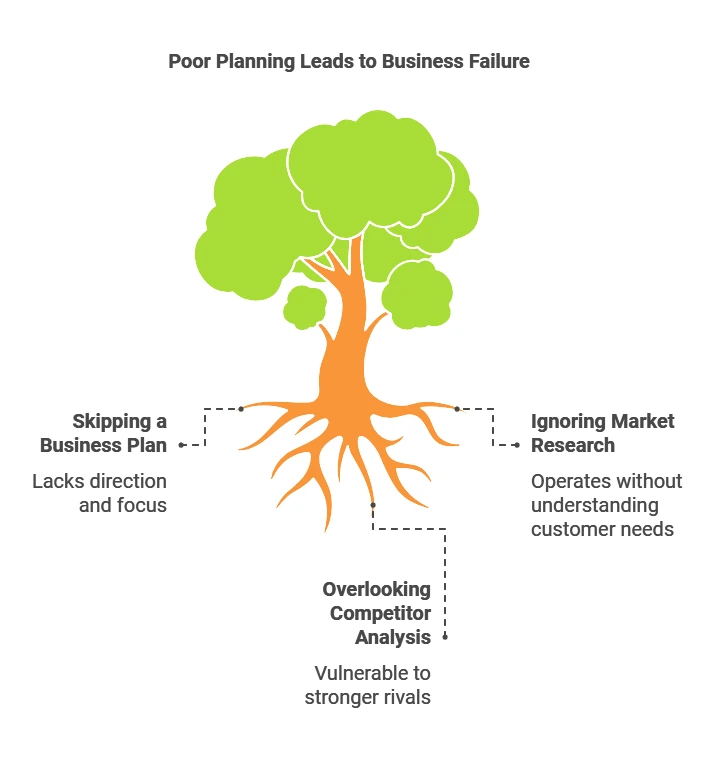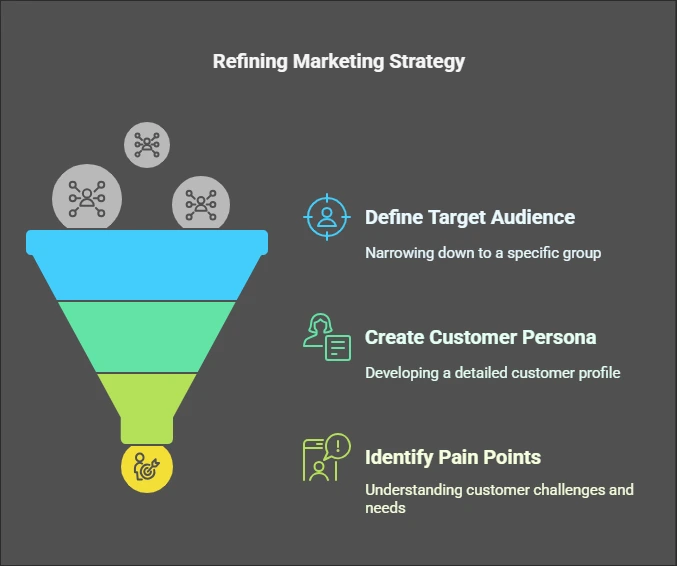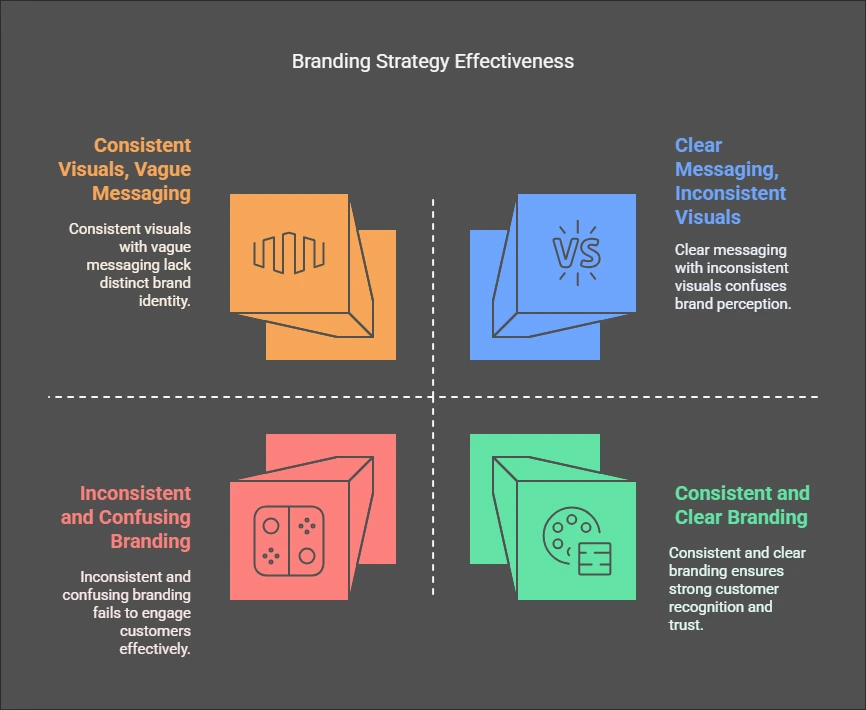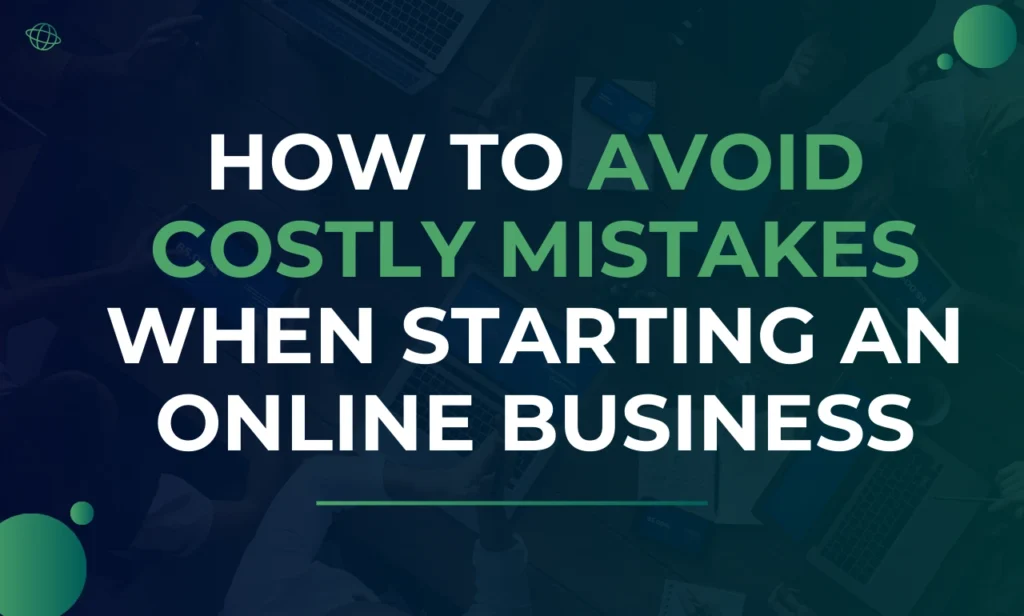Table of Contents
Introduction
Starting an online business is one of the most exciting ventures you can embark on. It’s a chance to turn your passions into a source of income, gain financial independence, and work on your own terms. The digital age has made it easier than ever to reach a global audience, but while the opportunities are immense, so are the challenges.
Many entrepreneurs dive in headfirst, only to encounter obstacles they hadn’t anticipated. The journey to building a successful online business is rarely smooth, but the bumps along the way are valuable learning experiences. By understanding the common mistakes others have made, you can pave your own path with fewer missteps and greater confidence.
Why Starting an Online Business Is Exciting but Challenging
The thrill of starting an online business comes from the freedom and possibilities it offers. You can pursue a niche you’re passionate about, build a brand that reflects your personality, and reach customers worldwide—all from the comfort of your home. The low startup costs compared to traditional businesses make it an attractive option for aspiring entrepreneurs.
However, the road to success isn’t all sunshine and rainbows. The online marketplace is highly competitive, and the ever-evolving digital landscape demands constant adaptation. Challenges like managing finances, navigating technology, and standing out from the crowd can feel overwhelming. Recognizing these hurdles and preparing for them can mean the difference between thriving and failing.
Importance of Learning from Mistakes
Mistakes are inevitable, especially when venturing into uncharted territory. But the key to success lies in how you respond to them. Every misstep offers a lesson that can refine your strategy and strengthen your business. Understanding what works—and what doesn’t—helps you make informed decisions and build resilience.
By proactively learning about common pitfalls, you gain a head start. Avoiding avoidable errors not only saves time and resources but also boosts your confidence as you navigate the complexities of running an online business.

1. Lack of Proper Planning
Starting an online business without a clear plan is like setting sail without a map. While spontaneity has its charm, a lack of direction can quickly lead to frustration and failure. Planning forms the foundation of your business, outlining your goals, strategies, and potential challenges.
1.1 Skipping an online Business Plan
A business plan is more than just a document; it’s a roadmap to success. It defines your mission, identifies your target audience, and lays out your revenue model. Skipping this step is like building a house without blueprints—it might stand for a while, but cracks will soon appear. Taking the time to create a detailed business plan helps you anticipate obstacles and stay focused on your objectives.
1.2 Ignoring Market Research
Market research is the cornerstone of understanding your industry and customers. Without it, you’re operating in the dark, relying on guesswork to make decisions. Research helps you identify trends, understand customer needs, and discover untapped opportunities. Ignoring this step can lead to wasted efforts on products or services that don’t resonate with your audience.
1.3 Overlooking Competitor Analysis
Competition is inevitable, but it doesn’t have to be intimidating. By analyzing your competitors, you can identify what they’re doing well and where they’re falling short. This insight helps you carve out your unique value proposition and position yourself more effectively. Overlooking competitor analysis leaves you vulnerable to being overshadowed by more prepared rivals.
2. Choosing the Wrong Niche
Your niche is the heart of your online business, and choosing the right one can make or break your success. It’s not just about picking something popular—it’s about aligning your interests with market demand and ensuring long-term viability.
2.1 Following Trends Without Passion or Knowledge
Jumping on a trending niche might seem like a shortcut to success, but it’s a gamble. Trends fade, and without genuine passion or expertise, you’ll struggle to maintain interest and credibility. Building a business requires dedication, and choosing a niche you’re passionate about ensures you stay motivated, even when challenges arise.
2.2 Ignoring Market Demand
On the flip side, passion alone isn’t enough if there’s no demand for your product or service. Ignoring market demand leads to wasted time and resources on a business that struggles to attract customers. The key is finding the sweet spot where your interests intersect with what people are actively seeking. Conducting thorough research ensures you enter a niche with both enthusiasm and potential profitability.
By avoiding these common mistakes and approaching your online business with preparation and intention, you set yourself up for success. The journey may be challenging, but with the right mindset and strategies, the rewards are well worth the effort.
3. Failing to Define the Target Audience

Your target audience is the group of people most likely to buy your product or service. Without a clear understanding of who they are, your marketing efforts will feel like shouting into the void, hoping someone listens. Defining your audience ensures your message resonates with the right people, increasing your chances of success.
3.1 Not Identifying the Ideal Customer Persona
An ideal customer persona is a detailed representation of your perfect customer. It includes demographics like age, gender, and location, as well as psychographics such as interests, values, and buying behavior. Failing to identify this persona leads to generic, ineffective marketing. When you know your ideal customer, you can craft personalized campaigns that grab their attention and drive engagement.
3.2 Neglecting Customer Pain Points
Every successful product or service solves a problem. If you don’t understand your target audience’s pain points, you can’t position your offering as the solution. Neglecting this step results in missed opportunities to connect with your customers on a deeper level. Researching your audience’s challenges and frustrations allows you to tailor your messaging and show how your business can make their lives easier.
4. Poor Financial Management
Financial management is the backbone of any successful business. Mishandling your finances can lead to cash flow problems, missed opportunities, and even business closure. Proper budgeting and tracking ensure you stay on top of your financial health.
4.1 Underestimating Startup Costs
Many new entrepreneurs underestimate the costs of starting an online business. While expenses are typically lower than for traditional businesses, they still exist. Website development, marketing, software tools, and inventory (if applicable) all add up. Underestimating these costs can leave you scrambling for funds or cutting corners in critical areas.
4.2 Overspending on Non-Essentials
On the other hand, some business owners go overboard, spending money on things they don’t need right away. Fancy branding packages, top-tier software, or an overly elaborate website might seem appealing, but they can drain your budget. Focus on the essentials and scale up as your business grows.
4.3 Not Tracking Income and Expenses
Failing to track your financials is a recipe for disaster. Without accurate records, you can’t assess your profitability, prepare for taxes, or identify areas for improvement. Using tools like accounting software or even simple spreadsheets can help you monitor your cash flow and make informed decisions.
5. Weak Branding Strategy

Your brand is more than just a logo or a tagline—it’s the personality and promise of your online business. A strong brand builds trust, creates emotional connections, and makes your business memorable. A weak branding strategy, however, can confuse potential customers and make you fade into the crowd.
5.1 Inconsistent Visual Identity
Consistency is key when it comes to branding. Your logo, color scheme, fonts, and imagery should align across all platforms, from your website to social media profiles. An inconsistent visual identity dilutes your brand and makes it harder for customers to recognize and remember you.
5.2 Unclear Brand Messaging
Your brand messaging is what you stand for, what you offer, and why it matters. If your messaging is vague or confusing, potential customers won’t understand what sets you apart. Clear, compelling messaging helps communicate your value proposition and fosters trust. It’s the difference between being just another option and being the go-to choice for your audience.
Avoiding these mistakes in defining your audience, managing finances, and establishing a strong brand lays the groundwork for a thriving online business. These foundational elements are crucial to not only attracting customers but also building long-term loyalty and success.
6. Subpar Website Design
Your website is often the first impression potential customers have of your business, and a poorly designed site can drive them away before you even have a chance to engage them. A well-optimized, visually appealing, and user-friendly website is essential for converting visitors into customers.
6.1 Ignoring Mobile Optimization
With the majority of internet users browsing on their phones, a mobile-friendly website is no longer optional—it’s a necessity. Ignoring mobile optimization frustrates users and increases bounce rates, as no one wants to pinch, zoom, or struggle to navigate a site on their phone. Responsive design ensures your website adapts seamlessly to any screen size, providing a smooth and enjoyable experience for all users.
6.2 Slow Loading Speeds
In today’s fast-paced digital world, users expect websites to load in the blink of an eye. Slow-loading pages not only frustrate visitors but also negatively impact your search engine rankings. Optimize your images, use caching tools, and minimize unnecessary scripts to ensure your site loads quickly and keeps users engaged.
6.3 Complicated Navigation
A confusing or cluttered navigation menu makes it hard for users to find what they’re looking for. This leads to frustration and abandonment. Keep your navigation simple, intuitive, and clearly organized. Ensure your most important pages are easily accessible and use clear labels to guide users seamlessly through your site.
7. Ineffective Marketing Efforts
Even the best product or service won’t sell itself. Effective marketing is key to driving traffic, generating leads, and growing your online business. Without a strategic and multi-faceted approach, your marketing efforts can fall flat.
7.1 Relying Only on One Marketing Channel
Pinning all your hopes on a single marketing channel—whether it’s social media, paid ads, or organic traffic—limits your reach and puts your business at risk. If that channel changes its algorithms or policies, your efforts could be wiped out overnight. Diversify your marketing strategy by leveraging multiple channels like social media, email marketing, content marketing, and paid advertising to ensure consistent growth.
7.2 Ignoring the Power of SEO
Search Engine Optimization (SEO) is one of the most effective ways to attract organic traffic to your website. Ignoring SEO means missing out on potential customers actively searching for what you offer. By optimizing your website for relevant keywords, creating valuable content, and building quality backlinks, you can improve your search rankings and drive consistent, long-term traffic to your site.
7.3 Not Building an Email List
An email list is one of the most valuable assets for any online business. Unlike social media platforms, where you rely on algorithms to reach your audience, an email list gives you direct access to your subscribers. Not focusing on building and nurturing your email list means missing out on an effective way to engage with your audience, promote your products, and drive repeat business. Use lead magnets, such as free guides or discounts, to encourage sign-ups and maintain regular communication to build trust and loyalty.
Avoiding these pitfalls in website design and marketing can significantly enhance your online business’s success. A user-friendly website and a well-rounded marketing strategy will not only attract potential customers but also keep them coming back for more.
8. Underestimating the Importance of Social Proof
Social proof is a powerful tool for building trust and credibility with your audience. People are more likely to purchase from online businesses that others recommend. Ignoring this crucial aspect of your business can make you seem less trustworthy and less appealing to potential customers.
8.1 Not Gathering Testimonials or Reviews
Customer testimonials and reviews are often the first thing potential buyers look for when evaluating your online business. Failing to collect and showcase positive feedback from satisfied customers means missing out on a key opportunity to build credibility. Encourage customers to leave reviews on your website or social media and highlight testimonials prominently to instill confidence in new visitors.
8.2 Ignoring Case Studies
Case studies go a step beyond testimonials by demonstrating how your product or service solved a specific problem for a customer. They provide detailed evidence of your value and help potential customers see how you can address their needs. By neglecting case studies, you miss an opportunity to share compelling, real-world examples of your success.
9. Lack of Customer Support
Outstanding customer support can set your online business apart from competitors and turn one-time buyers into loyal customers. Neglecting this area can lead to dissatisfaction, negative reviews, and lost sales.
9.1 Not Responding to Queries Quickly
In today’s fast-paced world, customers expect prompt responses to their questions. Slow replies to emails, chats, or social media inquiries can frustrate potential buyers and push them toward competitors. Invest in tools like chatbots or hire customer support representatives to ensure timely communication.
9.2 Ignoring Customer Feedback
Customer feedback is a goldmine of information for improving your products, services, and overall customer experience. Ignoring feedback not only alienates your audience but also robs you of valuable insights. Take the time to listen to your customers and implement changes based on their suggestions to show that you care about their needs.
10. Neglecting Legal and Tax Obligations
Overlooking the legal and financial aspects of running an online business can result in fines, lawsuits, or even the closure of your online business. Staying compliant with legal and tax requirements is essential for long-term success.
10.1 Failing to Register the Business Properly
Operating without properly registering your business can lead to legal complications. Whether you’re forming a sole proprietorship, LLC, or corporation, ensure you comply with local regulations. Proper registration establishes legitimacy and protects you from potential legal issues.
10.2 Ignoring Copyright and Trademark Issues
Using copyrighted materials or ignoring trademark regulations can result in costly legal battles. Always ensure you have the rights to use images, logos, or content in your online business. Additionally, trademark your own brand elements to protect them from misuse by others.
10.3 Not Understanding Tax Laws
Tax compliance is non-negotiable for any online business. Misunderstanding tax laws, failing to file taxes, or neglecting to keep proper financial records can lead to penalties and audits. Consult a tax professional to ensure you understand your obligations and take advantage of any deductions or credits available to you.
By addressing social proof, improving customer support, and adhering to legal and tax requirements, you create a solid foundation for your online business. These elements not only enhance trust but also protect your business from unnecessary risks, paving the way for sustainable growth and success.
11. Overcomplicating the Product/Service Offering
Simplicity is key when it comes to your product or service lineup. Overcomplicating what you offer can overwhelm potential customers and dilute your brand’s focus.
11.1 Offering Too Many Choices
While variety can be appealing, too many options can lead to decision fatigue. Customers may feel confused or hesitant to commit, which can hurt your sales. Instead, streamline your offerings and ensure each product or service has a clear purpose and value. A smaller, well-curated selection often drives better results than an overwhelming catalog.
11.2 Not Focusing on a Core Product
Trying to cater to everyone often leads to scattered efforts and subpar results. Without a core product to anchor your business, you risk spreading yourself too thin. Identify your flagship offering, refine it to perfection, and use it as the cornerstone of your business. Once you’ve established a solid foundation, you can expand strategically.
12. Poor Time Management
Time is one of your most valuable resources as an entrepreneur. Without effective management, you may find yourself spinning your wheels on low-priority tasks while critical aspects of your business are neglected.
12.1 Not Prioritizing Tasks Effectively
Every task isn’t equally important. Failing to differentiate between high-priority and less urgent tasks can leave you working hard but not achieving meaningful results. Use tools like to-do lists, project management software, or time-blocking techniques to focus on what matters most and tackle your goals systematically.
12.2 Overworking Without Delegation
Trying to do everything yourself can lead to burnout and inefficiency. Many entrepreneurs hesitate to delegate tasks, but outsourcing or hiring help can free up your time for strategic decision-making. Focus on areas where you excel and delegate repetitive or specialized tasks to qualified professionals to maximize productivity.
13. Ignoring Analytics and Metrics
Your business generates a wealth of data that can guide your decisions and help you grow. Ignoring analytics means missing out on insights that can optimize your strategies and improve your results.
13.1 Not Using Tracking Tools
Without tools like Google Analytics, social media insights, or email marketing platforms, you’re essentially running your business blind. These tools provide critical information about customer behavior, traffic sources, and campaign effectiveness. Make it a priority to set up and regularly monitor these tools to track your progress.
13.2 Overlooking Data-Driven Decisions
Gut instincts and creativity are important, but they must be balanced with data. Ignoring metrics such as conversion rates, customer retention, or ROI can result in missed opportunities or wasted resources. Regularly review your data and use it to inform your strategies, from refining your marketing efforts to improving your products or services.
By simplifying your offerings, managing your time effectively, and leveraging data analytics, you can create a more focused, efficient, and results-driven business. These practices not only streamline your operations but also enhance your ability to adapt and grow in a competitive market.
14. Underestimating Competition
No business operates in a vacuum, and failing to recognize the role competitors play in your industry can be detrimental. Understanding and standing out from the competition is essential for long-term success.
14.1 Not Differentiating from Competitors
When your offerings look similar to others in the market, customers have little reason to choose you. Differentiation is key—whether through pricing, quality, customer experience, or unique features. Identify your unique value proposition and highlight it consistently in your branding and marketing efforts to carve out your niche.
14.2 Ignoring Competitor Strategies
Competitors can be a valuable source of insight. Ignoring their strategies means missing opportunities to learn what works and what doesn’t in your industry. Regularly analyze competitors’ marketing campaigns, pricing models, and customer engagement tactics to refine your approach and stay ahead in the game.
15. Unrealistic Expectations
Setting unrealistic expectations can lead to frustration, disappointment, and poor decision-making. Entrepreneurship is a journey that requires patience and persistence.
15.1 Expecting Immediate Profits
It’s tempting to assume that your business will start generating significant revenue right away. However, most ventures take time to break even, let alone become profitable. Unrealistic profit expectations can lead to overspending or abandoning the business prematurely. Understand that growth is gradual and plan your finances accordingly.
15.2 Underestimating the Learning Curve
Running an online business involves a wide range of skills, from marketing to customer service. Expecting instant mastery of these areas can set you up for disappointment. Embrace the learning curve and view mistakes as opportunities for growth. Seek resources, training, or mentorship to build your expertise steadily.
16. Lack of Adaptability
In a dynamic digital landscape, adaptability is a crucial trait for success. Businesses that fail to evolve often get left behind.
16.1 Failing to Respond to Market Changes
Market trends, customer preferences, and technology evolve rapidly. Sticking to outdated products, services, or strategies can make your business irrelevant. Stay informed about industry developments and be willing to pivot your approach to meet new demands. Flexibility allows you to remain competitive in a changing environment.
16.2 Sticking to Outdated Strategies
What worked yesterday may not work tomorrow. Clinging to outdated marketing tactics, operational processes, or customer engagement methods can stifle growth. Regularly evaluate your strategies and experiment with new ideas to keep your business innovative and relevant.
By acknowledging competition, setting realistic expectations, and staying adaptable, you equip your business with the resilience it needs to thrive. These practices enable you to face challenges with confidence and position your online business for sustainable success.
17. Not Networking or Building Partnerships
Networking and partnerships are often overlooked in the pursuit of running an online business, but they can significantly amplify your reach and credibility. Building connections opens doors to new opportunities and resources that can propel your business forward.
17.1 Neglecting Collaboration Opportunities
Collaboration with other businesses or influencers in your niche can expand your audience and enhance your brand’s reputation. For instance, co-hosting webinars, creating joint content, or participating in cross-promotions can introduce your business to a broader audience. Neglecting these opportunities limits your growth potential and leaves you isolated in the competitive digital landscape.
17.2 Ignoring Industry Communities
Industry communities—whether on social media, forums, or at events—are hubs of knowledge and networking. By ignoring these communities, you miss chances to learn, share, and connect with like-minded individuals. Engaging with peers and experts not only builds relationships but also helps you stay updated on industry trends and insights.
18. Overlooking the Importance of Content
Content is the backbone of online engagement, yet many businesses fail to prioritize it. A robust content strategy builds trust, educates your audience, and drives organic traffic to your site.
18.1 Not Blogging or Sharing Valuable Content
A blog is a powerful tool for showcasing expertise, answering common questions, and improving your site’s search engine ranking. Businesses that skip blogging miss an opportunity to connect with their audience and establish authority in their niche. Share insightful, actionable, and relevant content to keep your audience coming back for more.
18.2 Ignoring Video and Multimedia Content
Text-based content is important, but today’s audiences crave diverse formats like videos, infographics, and podcasts. Ignoring multimedia options can make your brand seem outdated or inaccessible to certain demographics. Video content, in particular, drives engagement and conversion rates. Start by creating how-to videos, tutorials, or behind-the-scenes clips to make your business more relatable and appealing.
By actively networking, forming strategic partnerships, and leveraging the power of content, you can strengthen your online presence and build a community of loyal customers. These strategies not only foster growth but also establish your business as a trusted leader in its niche.
19. Inconsistent Work Ethic
Success in any online business requires consistency and dedication. A lack of focus or wavering commitment can derail progress and prevent long-term achievements.
19.1 Losing Focus Over Time
It’s easy to start strong but lose focus as challenges arise. Without a clear daily plan and long-term vision, your efforts can become scattered. To maintain momentum, set specific goals, create a structured routine, and regularly review your progress to stay on track.
19.2 Failing to Stay Committed
The road to success often involves setbacks and slow progress. Some entrepreneurs abandon their ventures too quickly when results don’t materialize as expected. Staying committed, even during tough times, is crucial. Persistence, combined with adaptability, will ultimately yield results over time.
20. Ignoring Personal Well-Being
Entrepreneurs often fall into the trap of prioritizing work over personal health, which can lead to burnout and diminished productivity. A healthy, balanced lifestyle is vital for sustaining success.
20.1 Sacrificing Health for Work
Late nights, skipped meals, and neglecting exercise can take a toll on physical health. Poor health directly impacts your energy levels, decision-making abilities, and overall performance. Make time for regular exercise, healthy eating, and sufficient sleep to maintain peak productivity.
20.2 Neglecting Mental Wellness
Running an online business can be stressful, with the pressures of competition, deadlines, and financial uncertainty. Ignoring mental health can lead to anxiety and burnout. Incorporate mindfulness practices, take regular breaks, and seek support from friends or professionals when needed to safeguard your mental well-being.
Conclusion
Recap of Common Mistakes
Starting an online business is an exciting endeavor, but it comes with challenges. Avoiding common mistakes such as neglecting planning, underestimating competition, poor branding, or ignoring analytics can set you on the path to success. Equally important is maintaining a consistent work ethic and prioritizing personal well-being to ensure sustainable growth and fulfillment.
Encouragement to Start Smart and Avoid Pitfalls
Remember, every successful entrepreneur has faced their share of challenges and learned from mistakes. Starting smart, staying adaptable, and maintaining balance can help you overcome obstacles and build a thriving online business. Take your time, plan strategically, and embrace the journey with resilience and enthusiasm.
FAQs
What is the most common mistake when starting an online business?
The most common mistake is failing to plan adequately. This includes skipping a business plan, ignoring market research, and neglecting competitor analysis. A lack of preparation can lead to missteps that hinder success.
How can I ensure my online business is legally compliant?
Ensure compliance by registering your business, understanding copyright and trademark laws, and staying informed about tax obligations in your region. Consult a legal or financial professional if needed.
Why is it important to define a target audience?
Defining your target audience helps you tailor your products, services, and marketing efforts to meet their specific needs. It increases customer satisfaction and improves the efficiency of your marketing strategies.
What tools can help me track analytics for my online business?
Tools like Google Analytics, SEMrush, and HubSpot can help track website traffic, user behavior, and campaign performance. These insights are crucial for making data-driven decisions to optimize your business.
How long does it take to see success in an online business?
The timeline for success varies depending on factors like your niche, strategy, and effort. Most online businesses take several months to a few years to become profitable. Patience and consistent effort are key to achieving long-term success.

